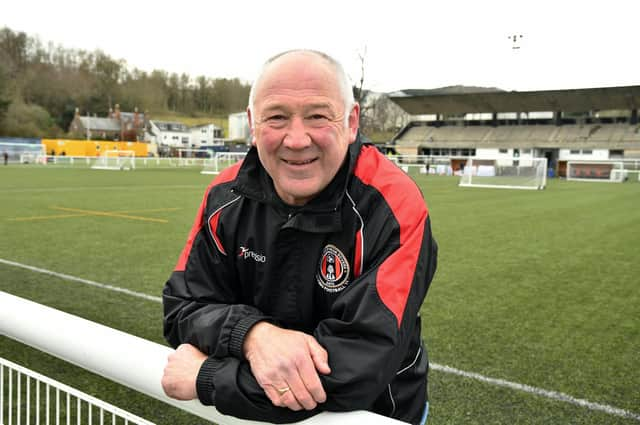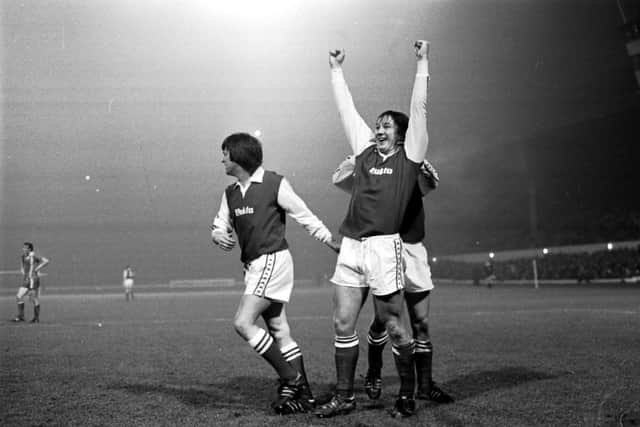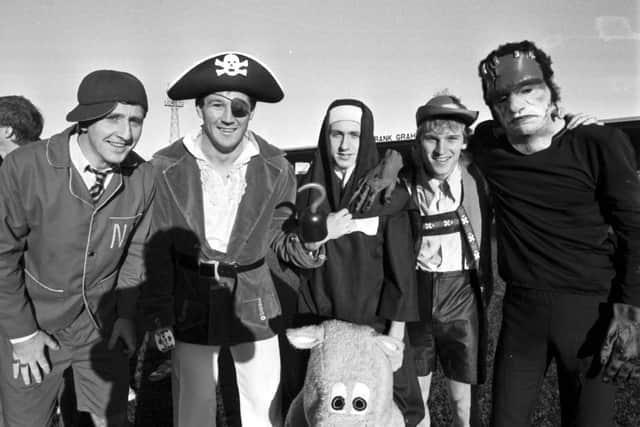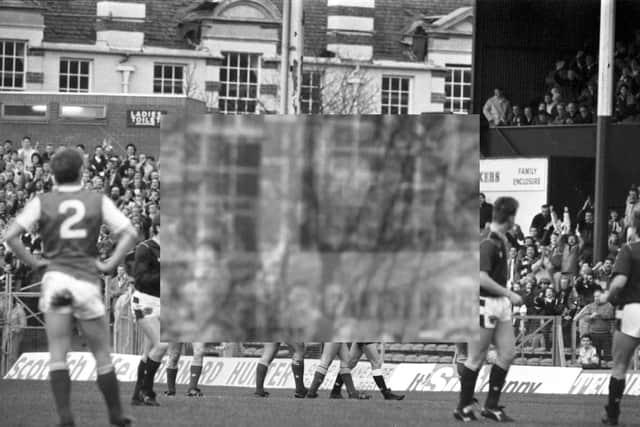Hibs stalwart Gordon Rae opens up on being thrust into three Edinburgh derbies in rapid succession and the winning goal against Hearts that sparked a riot


“George lived in Edinburgh’s North British Hotel and his club car was a crimson Saab 900 convertible,” he says. “And every Friday he’d have an ounce of his favourite cologne delivered to him from Paris. Each tiny bottle was supposed to have cost 100 quid, which was what I was earning a week back then.
“After games he’d splash it on and then he’d let the young boys like me, Craig Paterson and ‘Benny’ Brazil have the last few drops. George would be heading uptown while I would be going back to Bonnyrigg and my local, the Calderwood, saying to myself: ‘This isn’t happening. That’s the guy – the genius – from my Shoot! posters.’ As a player, from where he’d been, he was pretty much done but those final wee flashes of skill he showed us were still incredible. And what a lovely bloke he was. Just talking about him now is making me smile … ”
Advertisement
Hide AdAdvertisement
Hide AdIn fact, Rae smiles a lot today, such as when enthusing about walking football for which he’s a passionate advocate, having at first thought it a bit daft, but now playing three times a week, a ringer among the pensioners.


He smiles when recalling his comeback at 51 on Corfu. Resident there with his wife Margaret for ten years, he finally gave in to a bar-owner friend’s pestering to play for Kavadades Thunder. “Their league was the bottom of the pyramid in the Greek football. I needed clearance from the SFA and can just imagine the reaction when my application reached them: ‘What about this old arsehole?’ Ancient, so I was. Only three members of the team had dads who were older.”
Now 63 and back in Scotland in Selkirk, he even jokes when discussing Polycythemia vera. This is the rare blood disorder, a form of cancer, which afflicted him during his time on the shores of the Ionian Sea. “Absolute agony,” he says, “and a real worry for a while but I only ended up losing both big toes. They were like lumps of charcoal and one just fell off by itself. So if someone tries to stamp on them during walking football, well, they’re no’ there.”
And there are plenty of big cheesy grins on the subject of Edinburgh derbies. Jambos and Hibbies – excited or half-dreading the upcoming double-header? This guy played in three in rapid succession.
From his Midlothian mining town, growing up in Bonnyrigg’s Almond Crescent, part of what was known as the “nut scheme” where he was a neighbour of Hibs winger Eric Stevenson, Rae was recruited by the club at 17 and paid £10 a week, the scouts having been impressed by his brawn and the barrowload of goals he was scoring at youth level.


Though in his modesty he hesitates to call it a golden generation, there were a lot of kids of high promise around Edinburgh at that time. “I played with and against the likes of Walter Kidd, Eamonn Bannon, Billy Kirkwood and John Brough.” Three of them would become Jambos, to be joined by others from the capital scene: “John Robertson, Dave Bowman, Gary Mackay and Ian Westwater all trained at Hibs on Monday nights but [manager] Eddie Turnbull wouldn’t give them full-time contracts so [Hearts boss] Bobby Moncur took them to Tynecastle.”
Rae won his contract after turning up for the reserves “absolutely keechin’ myself” until being chaperoned by the old stager Roy Barry. He would move to the centre of defence later in his career and eventually captain Hibs – but starting out as a striker in August 1977 he hit the headlines right away.
“Second game for the big team, away to Rangers, 19 years old, and I scored in the fourth minute. Maybe I thought to myself, ‘This is easy’, but getting off the team bus Eddie, who was a brilliant manager, said: ‘You’re going to have the press after you – be careful what you say.’ He was right. The following morning, 7am, the phonecalls started: ‘Who are you? Where the hell have you come from?’”
Advertisement
Hide AdAdvertisement
Hide AdRae’s derby history was eventful. He netted in his first and would round off the grand total of 433 appearances in green and white against the big rivals. He was sent off in a derby, turn out in the quirky ones including the Skol Festival Cup and the Tom Hart Memorial Trophy, and go eight years without a victory in the fixture.


Induction came in ’78-’79, Hearts winning the season’s first capital skirmish 2-1. “I scored our goal up the top end of Easter Road with just a few minutes left. Jim Jefferies left one on me and I remember running with a limp back to halfway, hoping we could still save the game.”
That was the campaign Rae began to establish himself in the team and Turnbull would have a special assignment for him the next time the rivals met, in the Scottish Cup quarter-finals, again in Leith. “We always trained at Hunters Hall, dead basic compared to the swanky complex Hibs have now, but I suppose at least we got to ride in a Silver Fox, the top-of-the-range coach in Edinburgh - except the Thursday before that tie we switched to Riccarton, alongside the big cypress hedge, the one and only time that happened.
“Was Eddie worried about a spy? A guy with a dog scrutinising us? I wouldn’t be surprised – he was that thorough. After the session he said: ‘You’re playing on Saturday.’ That was the one and only time that happened 48 hours before a game. ‘And … I’ve got a job for you.’”
Drew Busby. Rae was to shadow him, even follow him to the loo. “That was going to be some job because Busby was a beast and we couldn’t allow him to dominate.” But Rae loved a physical challenge and was equal to this one in a crash-bang-wallop contest with Turnbull remarking: “There was no way you could play football out there … if you did you got run over.” In other words, a typical derby.
Hibs took the lead through George Stewart just before the interval after Busby was a casualty of the mayhem and had to be withdrawn. “Did he get injured? Ach, you’ve spoiled the memory. Well, at half-time Eddie said: ‘Now he’s gone I want you to get upfield and score us a goal.’”
Rae did just that and it proved to be the winner. “It was one of my best,” he says of the left-foot thundercrack from the edge of the box, following a Jackie McNamara free-kick and a Bobby Hutchison knockdown. “When I managed Gala Fairydean we had quite a few Jambos in the team and often at training I’d wind them up: ‘Lads, let’s recreate that goal I scored to beat the Hearts.’”
That was too much for the Gorgie support back in March ’79 and a group sneaked round the stadium and charged into the old Cowshed where Hibs fans were congregated. After a pitch invasion, bottle and cans flying and a policeman knocked to the ground, the arrest count totalled 40, with the Jambos among that number missing Derek O’Connor’s late consolation.
Advertisement
Hide AdAdvertisement
Hide AdThe following Saturday, same venue, the clubs resumed hostilities in the league, goals from Colin Campbell and Willie Gibson ensuring a 1-1 draw, to the relief no doubt of the Leith polis. Then, still in March, it was on to Tynecastle for the New Year’s Day encounter postponed because of snow, Gibson scoring again but Ralph Callachan and Ally MacLeod won it for Hibs.
There was no time between the tussles for the players to catch their breath or ponder how they might do things differently next time. So, over coffee in Galashiels today, I want Rae to tell me what the Edinburgh derby, specifically these three, were really like. “Like games of football,” he says. “I came to appreciate the derby’s importance later, especially for the fans, but in ’79 I was only 19 so I didn’t know much. In all games in the early days I just wanted to be in the team next time. There was a fear of failure. I didn’t want to be hauled off and never seen again.
“Also, I didn’t want to let the older guys down. George Stewart was a great mentor to me. Jackie McNamara taught me so much about life. Arthur Duncan was lovely and as for Ally MacLeod … what a bastard! I mean that in the nicest possible way. He slaughtered the young boys but it was for a reason. Ally made us tougher, and, by the way, what a fantastic player he was.
“Hibs weren’t on great money in those days but a bonus was a bonus. The senior guys had mortgages and families whereas I didn’t. They needed to trust me and this might sound big-headed and I mean it in the humblest way, but in that cup-tie Eddie put me, who was young and strong, up against Hearts’ danger-man and I seemed to do okay.” The bonuses were safe.
In the semi-finals Rae, dad to Colin and Jennifer with three grandchildren, scored again in the victory over Alex Ferguson’s Aberdeen but in the final against Rangers was upset at being left out of the starting line-up. No matter, there was plenty of time to catch up with proceedings – two replays, both involving an additional 30 minutes. “There would have been a fourth game if poor Arthur hadn’t scored that OG. I really thought we were going to lift the cup that year because with guys like Des Bremner – Ol’ Three Lungs who could run for ever – we were the equal of Rangers. No one talked about us having a cup curse in those days and me being a daft laddie I was like: ‘Next year, then.’ I never thought it would take until I was an old git who’d escaped to Corfu, two toes down and crying into my beer in my Hibs shirt, for us to finally win it.”
Next year, ’79-’80, would bring relegation. Bertie Auld took charge and united the club but, says Rae, not in a good way. “We had great team spirit because I’m afraid everyone, from the laundry woman up, disliked Bertie. One thing: he made sure we were fit. Four miles round the pitch every bloody day. He’d stand on the roof of one of the dugouts and roar at us. Derek Rodier got it the worst, and because he’d been to university Bertie called him a poofter. ‘He’s cut that corner! Right, everyone start again!’”
Rae enjoyed playing under club legends Pat Stanton and John Blackley although the former was hampered by financial constraints – “We had to wash our own kit and train with replica balls” – while during the latter’s reign he missed the 1985 League Cup final through suspension. Hibs lost to Aberdeen that day but Alex Ferguson would pay our man a huge compliment later by bringing Manchester United to Easter Road for his testimonial.
Before moving on to Partick Thistle, Hamilton Accies and Meadowbank Thistle, there would be a few more derbies for Rae, most ending in disappointment or frustration. “Hearts were good then but they didn’t win all the time. There were a few draws but we would lose bad goals, horrible goals, shitey goals.”
Advertisement
Hide AdAdvertisement
Hide AdA rare victory came at Tynecastle in 1988, Steve Archibald grabbing the winner. It was another blood-and-thunder affair with Rae being red-carded. “The walking football guys found my tackles on YouTube and they like to tease me about them. What can I say? Alex Miller – we didn’t get on – fined me a hundred quid.”
He could also say that by then he’d become one of the senior men, steeped in the Edinburgh contest. Before he goes off to resume playing at a stroll he flicks through the photos on his phone to show me the one of his goal celebration from ’79, both arms aloft. “That was a perishing cold day, played with an orange ball. I can still see my shot, bang in the top corner, which was more than could be said for [Hearts goalkeeper] John Brough. He’s a pal – we played juveniles together – and whenever we bump into each other I tell him that it was bouncing back out of the net before he’d even begun his dive!”
Comments
Want to join the conversation? Please or to comment on this article.